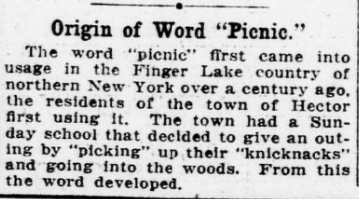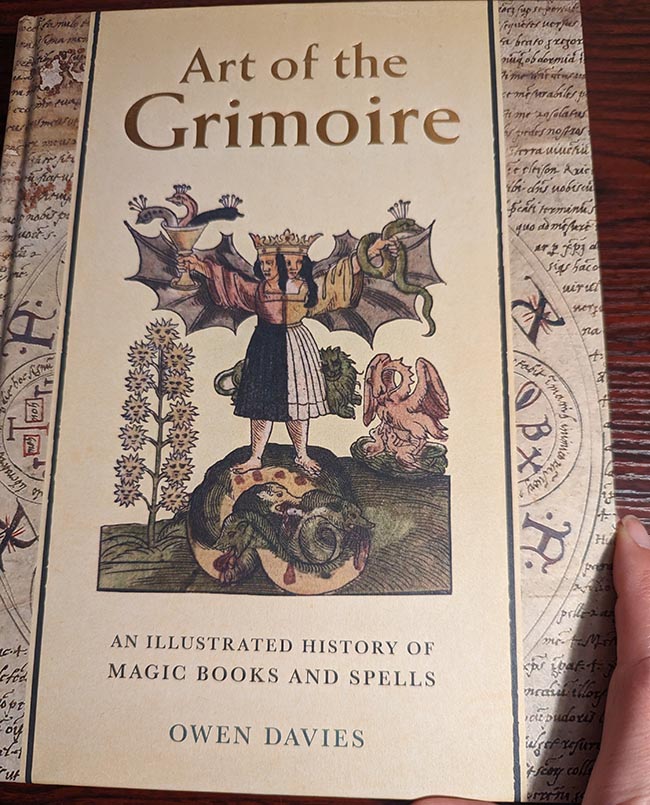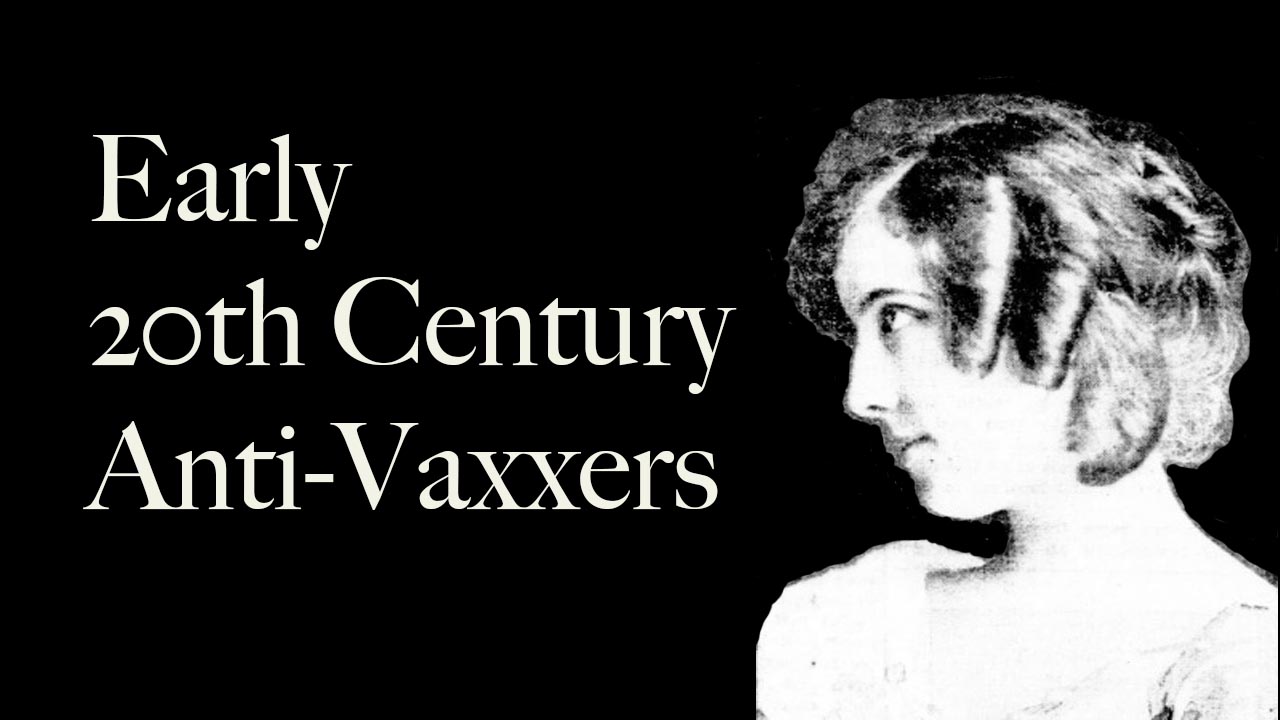
Are vaccines a medical delusion? That was a question being asked by the authors of an ad that appeared in various U.S. newspapers in 1919.
The ad asked what benefit was given to the vaccinated baby and referred to the inoculations as tainted pus vaccines.
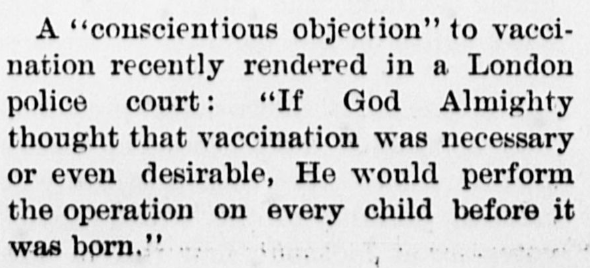
Furthermore, the ad stated that “you may make this world safe for democracy, but this world will not be safe to live in as long as from the cradle to the grave the people are made the victims of the prevailing loathsome inoculations with vaccines and bacteria. All true Americans must help to stop our governmental policy of poisoning the blood of babies and grownups with putrid stuff.”
Of course, this is not the first time that vaccines were labeled putrid and icky. Back in 1894, an anti-vaxxer gave her views in a Wisconsin newspaper as follows:
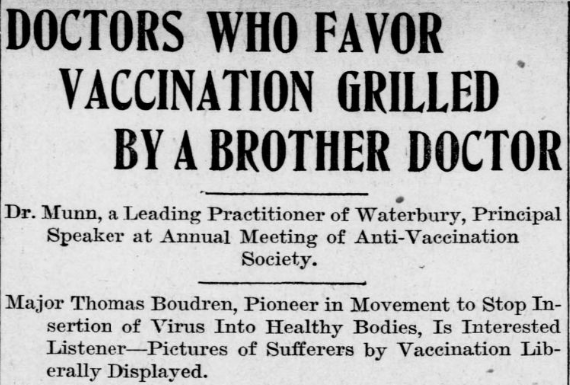
“Words cannot express the horror I feel in having my children vaccinated. I thought God had made them as near right as possible. I have been told many times that nature seemed to have done everything possible for them, but I find, according to law, God does not know how to make children. He has forgotten – in the case of my children at least – to insert a vile, putrid poison into their now pure and healthy blood.” [1]
In 1901, we find similar sentiments from parents regarding vaccinations. One father stated that:

“We are law abiding citizens, ready at all times to uphold the dignity of the law and demand its observance, but we do protest against the so called authority that allows a lot of scavengers to go into our schools, compel our daughters to bear their arms and then without medical authority or knowledge, say to that child, ‘You have not been vaccinated, go to your home and don’t return until you have obtained a vaccination certificate.’ He a fit person to say whether the poisonous animal lymph injected into my child’s body has taken or not? He a fit person? I protest, and I shall invoke the law in an effort to sustain my position.” [2]
By 1908 there was an anti-compulsory vaccination conference in Philadelphia. The purpose of the conference was:
“To promote the universal acceptance of the principle that health is nature’s greatest safeguard against disease, and that therefore the state has no right to demand the impairment of the health of any person, whether by vaccination or by any other means.”
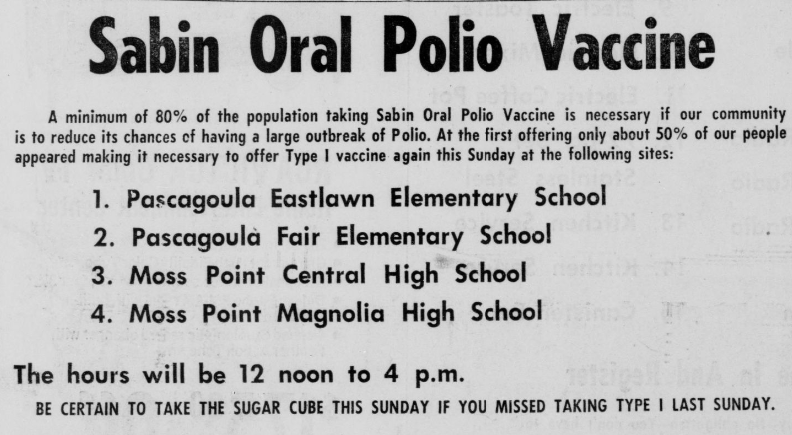
and
“To take steps to abolish all oppressive and unconstitutional medical laws, and to resist the proposed enlargement of the scope of state medicine.”
Surprisingly, there were numerous doctors who were also anti-vaxxers and they joined the religious objectors by claiming that the smallpox vaccine did indeed give people the “mark of the beast.” These anti-vax doctors also claimed that their medical brethren were addicted to the vaccine practice and that these vaccine doctors were lying when they said that nothing but vaccines could prevent smallpox.

Anti-vaccination societies sprung up all across the United States as governments tried to push for forced vaccinations in schools. Numerous parents began keeping their children home from schools to prevent forced vaccinations and pro-vax doctors began pushing back against anti-vaxxers.
As much as pro-vaccine doctors pushed for every infant and child to get vaccinated, there had already been decades of religious resistance in place. The religious trend against vaccines can be seen in a report published in 1871 where a Unitarian minister in England published his list of reasons to oppose vaccinations. His six reasons were as follows:
“1. Vaccination implies that God has made our bodies imperfect, and that, in order to enable them to be healthy through life, they need perfecting by diseasing with cow pox.
“2. Vaccination is an attempt on the part of the state to establish a medical creed, and ought as much to be resisted as a state theological creed.
“3. Vaccination is proved to be attended with so much danger that no father who desires the wellbeing of his child ought to risk it.
“4. Even if it could be proved that the vaccinated enjoy greater immunity from small pox, still government would no more have a right to enforce compulsory vaccination than it has to enforce total abstinence because total abstainers enjoy a greater immunity from cholera than drinkers.
“5. As a preventative of small pox, vaccination is a failure. I say this with a knowledge of the statistics, which are so often held up to prove the contrary.
“6. Vaccination either can save people from having small pox or it cannot. If it can, the vaccinated can never suffer from the unvaccinated and therefore have no right to compel them to adopt their practice; and much more tyrannical is it if it cannot.” [3]
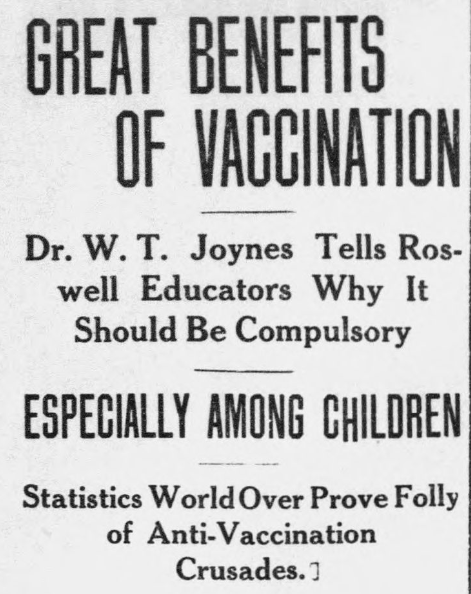
In 1925, a Connecticut father used religious objection as an excuse for not sending his eight-year-old to school. He was arrested and when in court he claimed that he had removed her from school to prevent her from being vaccinated. The man told the judge that vaccinations were contrary to the Scriptures and to his religious beliefs. He had had fifteen children in all. Five were deceased and ten were still living. The judge ordered him to place his daughter back in school and that he would face a penalty if he failed to do so.
In 1940, health officials had to battle rumors that the typhoid vaccine was ineffective. Statistics proving the vaccine’s effectiveness were published in newspapers across the U.S.
From the 1950s onward, there have been numerous objections to the use of vaccines, but nearly all the reasons against vaccine use were originally used during the late 19th and early 20th centuries.
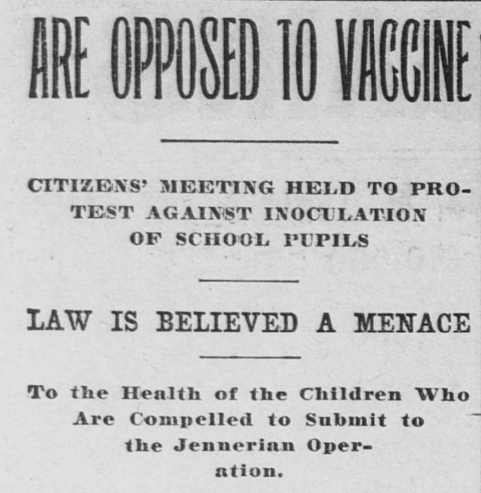
Religion was the most cited reason for not getting a vaccination, with people believing that God would protect them, heal them, or that God had plans for them after they were dead.
Next, people believed that the government had no rights over their bodies. Forced vaccines violated their basic human rights.
Finally, the people of the early 20th century doubted that the vaccines even worked. To be fair, there were many vaccines being trialed during the early 20th century and quite a few of them, such as the Rocky Mountain spotted fever vaccine, did not work. However, the failures do not lessen the fact that many vaccines do, in fact, work and help prevent the spread the infectious diseases.

